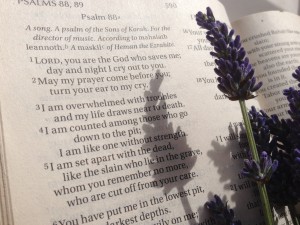It doesn’t have 23’s comfort or 1 or 84’s pictoral beauty. There’s no trace of 27’s confidence or 119’s mature, practiced declaration of truth. But it’s become deeply precious to us. Why? Because its fragrance of lament is left to linger unresolved…
Psalm 88 is actually left out of a lot of psalm cycles completely. And in fact, this is reflective of a wider issue.
The first couple of times we went round psalm cycles at the Sanctuary we didn’t come across it – but when we subsequently discovered the cycle we were using missed it and some other troubling passages out, we stopped using it and chose instead to rotate through the psalms numerically – and in full.
On the last day it came round – a few days ago – psalm 88 seemed to jar even more than when read in isolation. It came up alongside ‘Strong’ as the characteristic of God in focus and Joshua 23:1-11 as the daily verse and context!
We chose to face the tension head on.
There is a temptation to edit out uncomfortable parts of scripture which we can all fall into and which is nowhere more evident than with the psalms. They often go into territory we’re uncomfortable with reading out loud – at least in our religious gatherings if not in our hearts, where perhaps very little of their content is truly unfamiliar and unechoed.
But we need their honesty. And their demonstration that all emotions can be taken to God; that it is appropriate to speak the truth to him, not to come with a pious veneer that smooths over the jagged, difficult bits.
Usually we can be comforted by the fact that their unrestrained lament, deep questioning and thinly disguised despair come to a place of praise, resolve or resolution. There are very few psalms that leave us feeling that the speaker – and we as we read them – are staying where we started off. Instead, the speaking of truth and the coming to God seems to have worked redemption and transformation on the pray-ers’ words by the end of the song.
But this reassurance isn’t to be found in Psalm 88.
Oh dear.
It does open with a safe statement – ‘Lord you are the God who saves me; day and night I cry out to you’ but after this there is nothing but statements of suffering, affliction and rejection. The psalmist lays his sufferings at God’s door – seeing him as the origin and author of all his pain.
And the lament rises in volume, as if the sobbing is getting louder. Far from concluding with a re-assertion of God’s salvation, it’s closing three verses get even worse:
‘From my youth I have suffered and been close to death; I have borne your terrors and am in despair. Your wrath has swept over me, your terrors have destroyed me. All day long they surround me like a flood; they have completely engulfed me. You have taken from me friend and neighbour – darkness is my closest friend.’
Oh.
And it’s even blacker when we hear it taken out of the more familiar cadences of a traditional version like the NIV and hear it in our own speech. Not so extreme now? You might have even said some of these words yourself – to God or to a friend – in desperate times…
The Message includes this language for example:
‘God, you’re my last chance of the day… I’m caught in a maze and can’t find my way out, blinded by tears of pain and frustration. I call to you God, all day I call.’
And The Voice puts it like this:
‘My heart can’t bear the weight of all this sorrow… I am in a trap and cannot be free… My eyes grow dim, weakened by this skickness; it is taking my strength from me. Like a worn cloth, my hands are unfolded before You daily?’
And that’s exactly why we need this psalm:
We need to know we are still loved and welcome when we feel as low at the end of a time of prayer as we did at the beginning.
We need to know God is listening when we cry and shout the same prayers we did yesterday, last week, last year….
We need to know this psalm is there to put in the hands of people who have nothing but pain to pour out to God on a particular, given day. Instead of being Job’s comforters, we can point them to the holiness of unresolved honesty and not expect them to process all their grief or suffering in one session, after which we’re expecting them to be fine.
After all, this psalm was composed by someone with a serious – and possibly terminal – illness, feeling lonely and abandoned by God.
We need to know this psalm is there to not pray prayers that minimise or sanitise or qualify the suffering of others, but to come alongside them and plead their case honestly before God.
There are desperately ill, poor or persecuted Christians – and brothers and sisters living in war zones or fleeing from them – who are able to wholeheartedly praise and rejoice despite their circumstances.
But there are others who are afraid, devastated and completely at the end of themselves. Probably they are not distinct groups but the same people. Probably there are days when perseverance feels possible. And days when it doesn’t.
This blog isn’t going to resolve either. It’s just going to leave you to look again at Psalm 88. And to thank God for the surprising hope and resource it gives us to live and pray with.
If you’ve found this blog helpful, you might also be interested in reading our longer article on using the Psalms as our worship school
